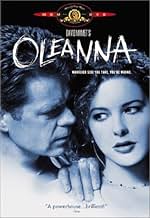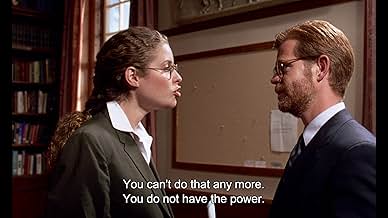PUNTUACIÓN EN IMDb
6,5/10
3,8 mil
TU PUNTUACIÓN
Cuando un estudiante visita a su profesor para discutir cómo falló su curso, la discusión toma un giro incómodo.Cuando un estudiante visita a su profesor para discutir cómo falló su curso, la discusión toma un giro incómodo.Cuando un estudiante visita a su profesor para discutir cómo falló su curso, la discusión toma un giro incómodo.
- Premios
- 1 nominación en total
Diego Pineda
- Quarterback
- (sin acreditar)
Scott Zigler
- Clerk in Copy Shop
- (sin acreditar)
Reseñas destacadas
David Mamet can write a play! This one made me writhe with anger at the P.C. crowd in our universities (not that all PC is bad--I am a linguist)who are watering down the national education. What's wrong with saying what you mean? I am a woman and I cannot actually believe that there are two sides on this issue...a pat on the back cannot possibly be seen (alone) as sexual harassment, nor can writing a very bad essay merit an "A" in my idealistic mind. A poor writer is a poor writer, no matter what the background. Many of out best American writers have come from the working class. Should education be modified yet again to accommodate those who do not care to work for their merits? Just a thought. Would love to hear more from others...
This is a movie not without faults -- the dialog at the beginning is stilted, William H. Macy's performance is not without its weak spots -- but in spite of those quibbles, is a compelling, intriguing film.
The movie centers on the relationship between a student and a professor at an unnamed university. She goes to him for extra help in his class (but she may be just trying to set him up for a sexual harrassment lawsuit). He tries to help her with her studies (but may be trying to dominate and have innappropriate relations with her at the same time). As the relationship turns into a struggle, the viewer finds him/herself switching sides early and often. The tension in the film becomes the viewer's tension; during the final scenes you'll barely breathe.
The tagline is right -- whatever side you choose, you're wrong. I've seen this movie lambasted as being anti-feminist, lauded for being pro-feminist, hated for being anti-establishment, pro-establishment, racist, sexist, etc. In reality, it is all and none of these things. Oleanna is a mirror that forces us to examine and discuss our own convictions. That it accomplishes this while still being an exciting film makes it worth seeing more than once.
The movie centers on the relationship between a student and a professor at an unnamed university. She goes to him for extra help in his class (but she may be just trying to set him up for a sexual harrassment lawsuit). He tries to help her with her studies (but may be trying to dominate and have innappropriate relations with her at the same time). As the relationship turns into a struggle, the viewer finds him/herself switching sides early and often. The tension in the film becomes the viewer's tension; during the final scenes you'll barely breathe.
The tagline is right -- whatever side you choose, you're wrong. I've seen this movie lambasted as being anti-feminist, lauded for being pro-feminist, hated for being anti-establishment, pro-establishment, racist, sexist, etc. In reality, it is all and none of these things. Oleanna is a mirror that forces us to examine and discuss our own convictions. That it accomplishes this while still being an exciting film makes it worth seeing more than once.
William H. Macy plays a professor, and Debra Eisenstadt plays a student who needs an A in the class she is taking from him. They argue as to why she should or shouldn't get an A. In the course of their arguing, the student finds cause to charge the professor, who is up for tenure, with sexual harassment and takes her case to the tenure committee.
The movie runs about an hour and a half. It was slow going, but as I was about to flip away from it (watching it on cable), I checked how long it had to go, and it was about half-way through. I figured, oh well, there's still some Canadian Club I need to get rid of, and tomorrow's a holiday, so I stuck with it. And I'm glad I did.
It is not a good movie, and maybe not even a very good play. Mamet's direction is ultra-stagy, even more declamatory than live theater would normally allow for, let alone a movie. For about an hour and a half, the actors hurl complete sentences and big chunks of paragraphs at one another.
Are Mamet and the actors really that insensitive to the conventions of film? Not likely. I think he chose that artificial manner in order to distance the audience from the characters and bring the ideas to the foreperhaps in the same vein as Bertolt Brecht's notion of "epic theater".
This is not so much a movie or a play as it is a staged philosophical dialogue. It examines the power relationships between man and woman, teacher and student. When the student comes to the professor to reveal the case she has built against him, it shows how words and deeds in one context can be given a whole different thrust and meaning when used to "build a case". Or are they really that different? Perhaps her case focuses and explicates the real underlying relationship of those words and deeds. Those are the kinds of questions Mamet raises, and I think it is a masterful exploration.
But is it a movie? Well, it is certainly dramatic, if stilted, and the dénoument is devastating. It may not be a good movie, but Mamet knew exactly what he was doing, and I'd watch it again.
The movie runs about an hour and a half. It was slow going, but as I was about to flip away from it (watching it on cable), I checked how long it had to go, and it was about half-way through. I figured, oh well, there's still some Canadian Club I need to get rid of, and tomorrow's a holiday, so I stuck with it. And I'm glad I did.
It is not a good movie, and maybe not even a very good play. Mamet's direction is ultra-stagy, even more declamatory than live theater would normally allow for, let alone a movie. For about an hour and a half, the actors hurl complete sentences and big chunks of paragraphs at one another.
Are Mamet and the actors really that insensitive to the conventions of film? Not likely. I think he chose that artificial manner in order to distance the audience from the characters and bring the ideas to the foreperhaps in the same vein as Bertolt Brecht's notion of "epic theater".
This is not so much a movie or a play as it is a staged philosophical dialogue. It examines the power relationships between man and woman, teacher and student. When the student comes to the professor to reveal the case she has built against him, it shows how words and deeds in one context can be given a whole different thrust and meaning when used to "build a case". Or are they really that different? Perhaps her case focuses and explicates the real underlying relationship of those words and deeds. Those are the kinds of questions Mamet raises, and I think it is a masterful exploration.
But is it a movie? Well, it is certainly dramatic, if stilted, and the dénoument is devastating. It may not be a good movie, but Mamet knew exactly what he was doing, and I'd watch it again.
This film is basically about a student who cannot accept she's failing class and decides to ruin her teacher's life by framing him. Around this basis, a quite witty dialogue is unfolded, which makes the movie intellectually stimulating and powerful. Additionally, it depicts the invalidity of some axioms of both professor and student community and portraits how people manipulate the truth to serve their personal interests. A very strong point is how pompous and cliche arguments about void pseudo-liberties alienate people from truly disastrous and desperate situations. As I see from other reviews, the play was much better, but unfortunately we didn't have the chance to see it here in Greece yet, so my first impression of Mamet's work was from this movie.
The tag line of this movie is that "whichever side you take, you're wrong," is itself wrong. There clearly is a wrong and right side. If we were to sit Catherine McKinnon and Andrea Dworkin down and show them only the first half of the movie, even they would be pressed to find any sexual harassment (let alone rape). We would find a self-absorbed professor, and knifing student (whose clipped speech, and apparent dumbfoundedness is belied later when she fabricates, embellishes, and spins the truth for her PC ends). If being self-absorbed is enough to get one fired and falsely accused of rape, then Mamet's lesson must be that the feminist orthodoxy has gone too far.
¿Sabías que...?
- CuriosidadesDavid Mamet's script was heavily criticized as sexist. He defended himself against this allegation in (Guardian supplement) (UK) 8 April 2004, pg. 8-9, "'Why can't I show a woman telling lies?'"
- PifiasWhen Carol leaves John's office after their second meeting, shouting "Help!", the shadow of the camera covers the door.
- Versiones alternativasThere is a version of the movie circulating in Australia, in a series of videos along with other David Mamet films including "A Life in the Theater". This particular copy of the film is timecoded. In that version, after Carol tells John not to call his wife "baby," (thus sending him into a torrent of rage), and he slaps her arm and grabs her, screaming a sexual expletive and raising a chair above her head, the door to the hallway swings open and a number of people stand in the hallway, observing the fight and thus hopelessly damning John. In the version now appearing on The Sundance Channel (10/05), the expletive is unchanged but he never lifts the chair and the door never opens; aside from a final exterior shot of the school, the film ends with Carol (Eisenstadt) having collapsed on the floor of John's office, and John sitting in his chair, his head buried in his hands.
- Banda sonoraLong Ago And Far Away
Words by David Mamet
Music by Rebecca Pidgeon
Soloist: Steve Goldstein (as Steven Goldstein)
© Copyright 1994 Dwight Street Music
Selecciones populares
Inicia sesión para calificar y añadir a tu lista para recibir recomendaciones personalizadas
- How long is Oleanna?Con tecnología de Alexa
Detalles
- Fecha de lanzamiento
- Países de origen
- Sitios oficiales
- Idioma
- Títulos en diferentes países
- David Mamet's Oleanna
- Localizaciones del rodaje
- Empresas productoras
- Ver más compañías en los créditos en IMDbPro
Taquilla
- Recaudación en Estados Unidos y Canadá
- 124.693 US$
- Fin de semana de estreno en EE. UU. y Canadá
- 25.316 US$
- 6 nov 1994
- Recaudación en todo el mundo
- 124.693 US$
Contribuir a esta página
Sugerir un cambio o añadir el contenido que falta

Principal laguna de datos
By what name was Oleanna (1994) officially released in India in English?
Responde






















